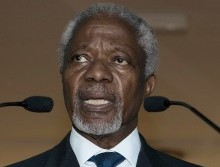With more and more dying every day in what has effectively become a civil war in Syria, the United Nations special envoy to the country, Kofi Annan, announced his resignation on Thursday. Annan, who helped broker a failed ceasefire and worked to bring about a political transition plan, pointed to a lack of international unity as the tipping point for the failure of his efforts. He also expressed dismay at the violence in the country.
“The increasing militarization on the ground and the clear lack of unity in the [UN] Security Council, have fundamentally changed the circumstances for the effective exercise of my role,” said Annan in a press conference republished on his website.
He said the initial agreement by major world powers in late June on a political transition plan, in which President Bashar al-Assad would have to eventually leave, later collapsed at the UN, “and that unity is still illusive.” Annan also spearheaded a six-point peace plan for the country that was approved by the Security Council.
“The bloodshed continues, most of all because of the Syrian government’s intransigence, and continuing refusal to implement the six-point plan, and also because of the escalating military campaign of the opposition—all of which is compounded by the disunity of the international community,” said Annan.
“At a time when we need— when the Syrian people desperately need action—there continues to be finger-pointing and name-calling in the Security Council.”
Annan’s resignation will be effective at the end of the month. He noted there was still potential for a better future for Syria if circumstances and approaches change.
US Ambassador to the UN Susan Rice said in a statement released by her office on Annan’s departure, “His mission could never have succeeded so long as the Assad regime continuously broke it pledges to implement the six-point plan and persisted in using horrific violence against its own people.
“When the Security Council failed to heed Mr. Annan’s repeated calls for collective and significant consequences for non-compliance with its prior resolutions, those members who blocked this action effectively made Mr. Annan’s mission impossible.”
The US has been a vehement critic of the Assad government, as well as the vetoes of Russia and China on escalated UN condemnation and threat of sanctions.
On Tuesday, Annan was vague on which nations he blamed for failing the Syrian people, pointing instead at general international disunity and regional nations that can wield influence in Syria. Despite the loss of the UN’s envoy, Rice expressed confidence in the eventual outcome in Damascus.
“The Assad regime’s days are numbered. The only question is how many more lives must be lost before it falls,” said Rice. “We will continue to work urgently with our partners in the international community—including the over 100 countries in the Friends of the Syrian People—to accelerate the transition, provide support to the opposition, and meet the increasingly grave humanitarian needs of the Syrian people.”
(By Joshua Spurlock, www.themideastupdate.com, August 2, 2012)

